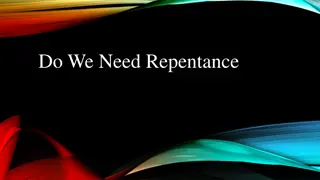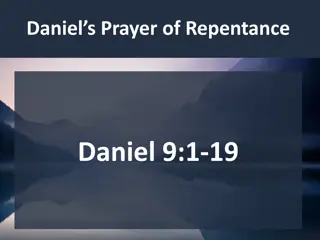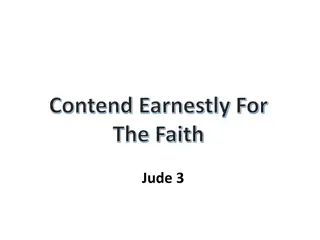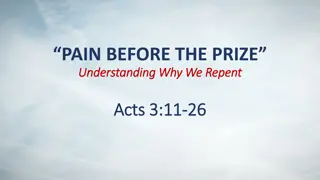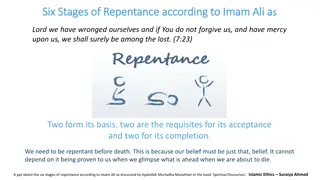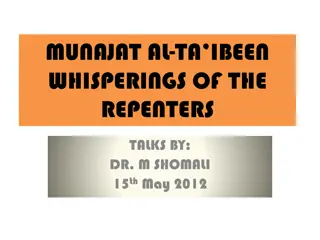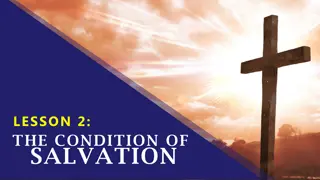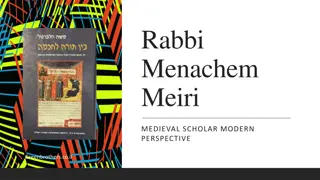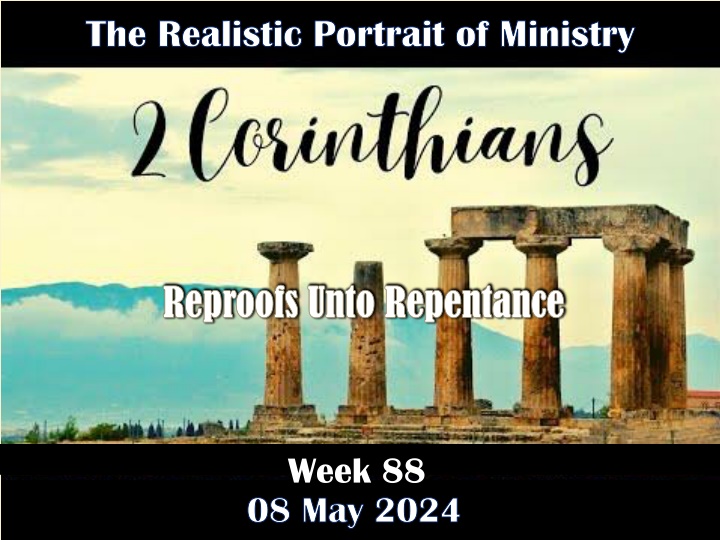
Understanding True Wisdom in Second Corinthians Study
Delve into the essence of wisdom as distinct from intelligence, experience, and knowledge in the exploration of Second Corinthians. Discover the divine perception needed to see life from God's viewpoint, drawing upon His insight and discernment.
Download Presentation

Please find below an Image/Link to download the presentation.
The content on the website is provided AS IS for your information and personal use only. It may not be sold, licensed, or shared on other websites without obtaining consent from the author. If you encounter any issues during the download, it is possible that the publisher has removed the file from their server.
You are allowed to download the files provided on this website for personal or commercial use, subject to the condition that they are used lawfully. All files are the property of their respective owners.
The content on the website is provided AS IS for your information and personal use only. It may not be sold, licensed, or shared on other websites without obtaining consent from the author.
E N D
Presentation Transcript
The Realistic Portrait of Ministry The Realistic Portrait of Ministry Reproofs Unto Repentance Reproofs Unto Repentance Week 88 08 May 2024
2 CORINTHIANS INTRODUCTION In our continuing study of Second Corinthians, the themes of this letter revolves around both the theological concepts and the practical aspects of Christian living. The primary issue at Corinth was the recognition of authentic ministry and submission to apostolic authority. Paul s corrective was to provide guidance and encouragement as the church navigates the challenges that continue to influence their unity, discipline, and spiritual growth. In our study, we are given insight into Paul s pastoral care for the Corinthian church, his approach to discipline and reconciliation, he highlights the transformative power of genuine repentance in the life of believers, and emphasizes the importance of humility, reconciliation, and spiritual growth within the Christian community.
2 CORINTHIANS - LESSON OVERVIEW Swindoll . . . opens our study with a much needed lesson on wisdom! He says . . . Wisdom seems to be one of the most difficult concepts to grasp for most people. If often gets confused with intelligence, smarts, knowledge common sense, experience, or even general information. For many people wisdom is an abstract idea rather than a concrete reality. One reason we may have trouble defining this term is because we have so few examples of genuinely wise people. Another reason is because wisdom naturally draws on other forms of knowledge but must be distinguished from them.
2 CORINTHIANS - LESSON OVERVIEW Wisdom is not the same as intelligence or book smarts or academic education. I ve met some extremely smart people, from astronauts to professional philosophers, world renowned scholars to greatly admired teacher. Not all of them were people I would describe as wise. Nor is wisdom the same as experience, knowledge, or common sense that comes with age and maturity. If a person eventually learns by making the same mistake over and over again he is nowiser than a trained house pet. Not every silver haired person wears the gray as a mark of wisdom.
2 CORINTHIANS - LESSON OVERVIEW The kind of true wisdom we need is divine perception, the ability to see life from God s perspective, drawing on His knowledge, discernment, insight, diagnosis, and prognosis. People aren t born with that kind of wisdom. It comes from God, not from men. James says . . . If any of you lack wisdom, let him ask of God, who gives to all liberally and without reproach, and it will be given to him (James 1:5). Proverbs 1:20-22, say that the na ve or simple-minded, the scoffers or rebellious cynic, and the fool or intentionally ignorant, all need this wisdom. Yet, they shrug it off and refuse to listen. They look at life from their own narrow, selfish, prejudice, worldly perspective rather than from God perspective.
2 CORINTHIANS - LESSON OVERVIEW Verse 23 continues by telling those seeking wisdom where to find it: Turn to my reproof, behold, I will pour out my spirit on you; I will make my words known to you. Reproof is a word that few of us associate with wisdom. We often couple it with shame, embarrassment, punishment and even anger. But not wisdom! Reproof, another term for rebuke, occurs when somebody points out a fault or flaw. It is not comfortable. It can be extremely painful. But when we listen, it becomes a path toward wisdom. In our lesson, we hear a conversation between Paul and the Corinthians where Paul refers to a reproof he provided in an earlier letter. Intended to set them on the right path of divine wisdom.
2 CORINTHIANS 7:8-12 8For even if I made you sorry with my letter, I do not regret it; though I did regret it. For I perceive that the same epistle made you sorry, though only for a while. 9Now I rejoice, not that you were made sorry, but that your sorrow led to repentance. For you were made sorry in a godly manner, that you might suffer loss from us in nothing. 10For godly sorrow produces repentance leading to salvation, not to be regretted: but the sorrow of the world produces death. 11For observe this very thing, that you sorrowed in a godly manner: What diligence it produced in you, what clearing of yourselves, what indignation, what fear, what vehement desire, what zeal, what vindication! In all things you proved yourselves to be clear in this matter. 12Therefore, although I wrote to you, I did not do it for the sake of him who had done the wrong, nor for the sake of him who suffered wrong, but that our care for you in the sight of God might appear to you.
2 CORINTHIANS 7:8-12 Here Paul refers to a letter he sent during the interval between 1st and 2nd Corinthians, that is now lost to us. This missing letter is sometimes called the severe or tearful letter because it rebuked the Corinthians for tolerating a sinning member in the congregation. After sending the letter, Paul had second thoughts about the pain it was sure to cause much like wanting to click the unsend button after sending a harsh email that could lead to more anger rather than constructive communication. However, after delivering the severe letter, Titus returned to report the Corinthians repentant spirit, which brought great relief to Paul. Paul s sharp note of rebuke, though painful even for him to write, led to a change of heart among the Corinthians.
2 CORINTHIANS 7:8-12 The difference between sorrow inflicted by God and sorrow inflicted by the world is that one is purposeful while the other is pointless. Sorrow according to God produces repentance; worldly sorrow produces death (7:9-10). From a spiritual perspective, the feelings of guilt, shame, and sadness that accompany a stern rebuke are not meant as a punishment, but as a call to repentance. By receiving the reproof, one opens the inner door of the soul to wisdom. By contrast, an angry reaction of resentment will bolt the door against an opportunity to learn from the experience.
2 CORINTHIANS 7:8-12 In verse 10, Paul says that godly sorrow produces repentance that leads to salvation. The word salvation used here refers to being rescued from the consequences of sin, not our eternal destiny. When one starts down a path of rebellion and refuses correction, they begin to experience the effects of alienation from God s people, God s principles, and God s power. The results! That person loses the safety of the church, the wisdom of God s Word, and the benefits of spiritual nourishment and inner strength. The final outcome of this can actually be physical death (1 John 5:16b).
2 CORINTHIANS 7:8-12 How do we know a person has responded with God-given wisdom to the correction? In 7:11, Paul provides a checklist of what, he saw in the lives of the Corinthians, to help us recognize true repentance: Earnestness a sincerity of heart. Godly sorrow an emotional response. Vindication an external verification of internal reality. Indignation a repugnant attitude toward sin. Fear a renewed reverence for God. Longing a desire for righteousness. Zeal an enthusiasm for doing what s right. Avenging of wrong a payback for any damages or losses.
2 CORINTHIANS 7:8-12 Paul had not doubts that the Corinthians response to his severe letter was genuine. Their wordsandactions demonstrated they were innocent in the matter (7:11). Paul reminds the Corinthians that their tolerance of the sin had done more than the sin itself. It had also created a rift between them and Paul. However, their repentance had not only corrected the initial problem of the members sexual relations with his fathers wife (1Cor. 5:1-13), but it had also healed their relationship with God and with Paul (7:12-13).
2 CORINTHIANS 7:13-16 13Therefore we have been comforted in your comfort. And we rejoiced exceedingly more for the joy of Titus, because his spirit has been refreshed by you all. 14For if in anything I have boasted to him about you, I am not ashamed. But as we spoke all things to you in truth, even so our boasting to Titus was found true.15And his affections are greater for you as he remembers the obedience of you all, how with fear and trembling you received him.16Therefore I rejoice that I have confidence in you in everything.
2 CORINTHIANS 7:13-16 Adding a personal touch, Paul exults in the Corinthians victory over sin. Not only did it save the congregation from their damaged relationship with God and others, it also restored their reputation in the community far and wide. Paul had previously shared with Titus the confidence he had in the Corinthians to do what was right a confidence that could have easily turn to disappointment. When Titus returned from his visit to Corinthian, having carried the severe letter with its harsh rebuke, Paul s praise of the Corinthians proved to be well placed. So when we look back over the emotional roller coaster we have traveled with Paul over these last two chapters.
2 CORINTHIANS 7:13-16 We will see that the ups and downs of ministry can feel nauseating at times. Yet at the end of it all, Paul lands in a place of comfort, rejoicing, and refreshment (7:13). What a change from the tension that existed before! Sin, anger, and distrust clouded everything. Without the strong reproof and the wise response to correction, none of this would have been possible. Remember where we started? If we want to be wise, we need to heed God sreproofs especially when they come from friends who love us, to rebuke us in a way that may seem harsh at the time. From the other angle, if we are going to have a fruitful ministry, we need to be willing to call unrepentant sinner to repentance not out of spite but out of love (Eph 4:15).
APPLICATIONS OF THE LESSON Calling Each Other To Account
APPLICATION CALLING EACH OTHER TO ACCOUNT Swindoll closes by talking about the blessing of having a true friend in your circle. He says . . . Clearly, the Corinthians were blessed to have a friend like Paul who didn t fear to wound them with the truth a friend who loved them enough to point out their failures. Proverbs 27:6 says, Faithful are the wounds of a friend. Most of us have friends with whom we can discuss spiritual things. But with how many of those friends do we really get personal? Ask yourself this! If your close friend were going astray, would you feel comfortable stepping in to confront the sin?
APPLICATION CALLING EACH OTHER TO ACCOUNT Or would you regard it as a private matter between your friend and God? Conversely, do you have anybody in your life who would step on your toes or block your path to prevent you from heading toward death? Or have you gathered around you a group of yes friends, who tell you only what you want to hear? It s not just for the believer s personal spiritual benefit, but for the good of the whole church body. That such quality relationships in which we can examine our integrity together prove indispensable.
APPLICATION CALLING EACH OTHER TO ACCOUNT Although we like to think that our sins don t hurt anybody but ourselves, we are wrong. Sin causes collateral damage. We can easily forget about the emotional damage done to those who love and care about us. We can also overlook the damage done to the ministry. But, when one part of the body suffers, the whole body suffers with it (1Cor. 12:26). We can even forget about the offense to God, who won t sit back and watch as His beloved children run headlong into destruction (Heb. 12:5-11). God s discipline of His children can seem harsh, severe, and painful. But in the end, it yields the peaceful fruit of righteousness (Heb. 12:11).
APPLICATION CALLING EACH OTHER TO ACCOUNT Paul reminded the Corinthians of their error and called the faithful to account and their repentance healed their relationship with Paul and God (7:12-13). Like Paul, faithful pastors must consistently engage in holding others accountable and giving biblical reproof as needed. If we would be honest, we all wish that confrontation, reproof, and discipline were not a part of ministry, but they are. Paul say to Timothy, his-pastor-in-training: All scripture is inspired by God and is profitable for teaching, for reproof, for correction, for training in righteousness; so that the man of God may be complete, thoroughly equipped for every good work (2Tim. 3:16-17).
APPLICATION CALLING EACH OTHER TO ACCOUNT A central part of Timothy s ministry pastoral ministry in Ephesus included preaching the Word in such a way that he would reprove and rebuke, not just exhort and teach. Conflict within a congregation leads to anxiety (2:4). It can be demoralizing for ministers and destructive to ministries. However, reproof that leads to repentance can resolve conflict and bring peace. This will lead to a flood of blessings that will renew relationships and revitalize ministries. True and faithful shepherds do not hesitate to bring required rebukes or administer necessary reproofs. Hirelings will do neither!
NEXT CLASS 15 May 2024 Before next class, read the below chapters in Before next class, read the below chapters in the KJV and in one other versions of the Bible, the KJV and in one other versions of the Bible, i.e., NIV, NRSV, TLB, CEV, etc i.e., NIV, NRSV, TLB, CEV, etc Chapter 8:1 9 Making Good Sense with Our Dollars


